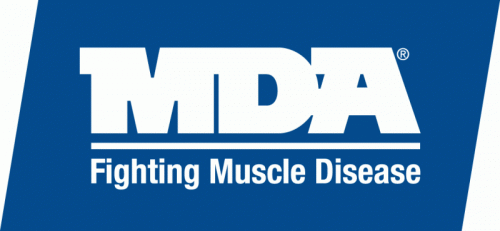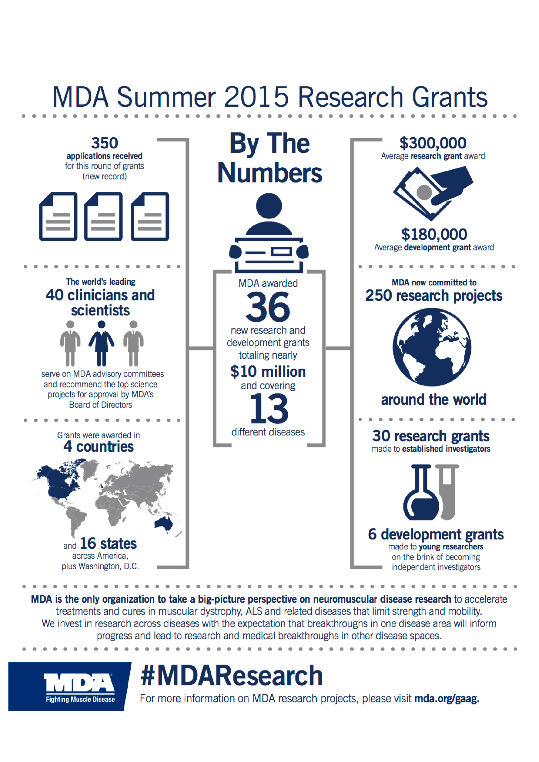Muscular Dystrophy Association Awards $10 Million In New Research Grants
Written by |

The Muscular Dystrophy Association (MDA) on August 26th announced its awarding of $10 million in new grants to scientists conducting leading-edge research on muscular dystrophy, ALS and related muscle-debilitating diseases.
Through its investigator-initiated application process, MDA had received 350 grant requests — a record number in its 65-year history of funding basic, translational and clinical research — and approved funding for 36 researchers, 53 percent of whom are new to MDA funding, with the expectation that breakthroughs in research on one disease will unlock new insights and discoveries for others. Clinical research received the greatest amount of funding growth, reflecting a deliberate effort by MDA to focus on funding more work related to therapy and drug development.
“Many people know that MDA’s research program plays a critical role in helping people fighting muscular dystrophy, ALS and related life-threatening diseases live longer and grow stronger, says Grace Pavlath, Ph.D., MDA Senior Vice President & Scientific Program Director,”But most probably don’t know very much about the specifics of how it does this. One way, that I’d like to touch on today, is through research (RG) and development (DG) grants. Earlier this month, MDA began funding 36 new research and development grants. With a nearly $10 million dollar commitment over the next three years, these 36 new grants are now supporting investigators seeking to advance the state of science and develop treatments and cures in 13 of the diseases in MDA’s program.”
Dr. Pavlath notes that six of the new awards are development grants, given to young investigators who demonstrate a commitment to continuing as leaders in the neuromuscular disease research field, and that these grants are intended to be used as seed money to help launch the scientific programs of these promising new researchers.
Thirty of the awards are research grants, given to independent investigators and covering research related to therapy development for the diseases covered by MDA.
MDA’s current research commitment totals about 250 research projects in 16 countries.
Louis M. Kunkel, PhD, a Professor of Pediatrics at Harvard Medical School and Boston Childrens Hospital, and Chairman of the MDA Scientific Advisory Committee, notes that:
“The muscular dystrophies are progressive disorders of striated muscle leading to breakdown of muscle integrity. Underlying this clinical presentation there is considerable genetic heterogeneity with the X-chromosomal recessive Duchenne and Becker forms comprising the majority of patients, and the related limb girdle muscular dystrophies (LGMD) being caused by an additional 10 different genetic loci.
“Much has been learned over the last 12 years about the molecular defects associated with the muscular dystrophies, beginning with the identification of dystrophin as the protein altered in Duchenne/Becker muscular dystrophy. Dystrophin has since been shown to be part of a complex of proteins at the muscle cell membrane known as the dystrophin associated protein (DAP) complex. Five other protein members of this complex are themselves encoded by genes that are disrupted in LGMD patients. The exact mechanism by which the muscle cell undergoes degeneration when this complex is disturbed is unknown. To date there is no known way to halt the muscle cell degeneration when this complex is perturbed, although animal studies have shown that introduction of the normal gene into diseased muscle is corrective for the problem.
“We continue our two broad areas of research to address the pathogenesis and treatment of the muscular dystrophies. The first is a continuation of our efforts to unravel the normal function of the dystrophin associated protein complex and why alteration of genes encoding members of the complex causes the phenotype of muscular dystrophy. The second is our continuing effort to develop a stem cell-based therapy for treatment of patients with muscular dystrophy. Both broad areas are driven by our hope to be curative for the muscular dystrophies.”
“These new grants are potential game-changers, a signal of our passionate resolve to helping kids and adults fighting neuromuscular diseases live longer and grow stronger,” says Valerie Cwik, M.D. , MDA’s Executive Vice President and Chief Medical & Scientific Officer. “There’s more new drug discovery underway than ever before, and we’re determined to double the number of promising human clinical trials in the next five years.” Dr. Cwik oversees MDA’s extensive research and health care services programs and represents the Association at national and international scientific meetings.
Tucson, Arizona based Dr. Cwik, has focused her career on neuromuscular diseases, has experience in clinical trials for Duchenne muscular dystrophy, ALS and diabetic peripheral neuropathy, and has mentored several neuromuscular fellows.
MDA notes in a release that its long-term investment in research has contributed to more than 30 clinical trials in the past year alone for novel drugs and other therapies aimed at treating a broad spectrum of neuromuscular diseases, and that the latest round of research grants were approved recently by MDA’s Board of Directors after careful deliberations and analysis by te organizations’s Medical and Scientific Advisory Committees, which are comprised of leading clinicians and scientists who in volunteer roles oversee the peer-reviewed process. This year MDA is funding 250 different research projects in 16 countries.
“We’re supporting the best of the best, thanks to generous sponsors and supporters who champion our work,” Dr. Cwik observes. “For MDA families, advancements can’t come soon enough.”
Earlier this year, MDA announced a five-year research plan to advance frontline discoveries, including:
• An increase in MDA research spending and a refocus of its research grant program to yield even better outcomes;
• Proactively approaching the marketplace with requests for proposals for specific funding opportunities, while continuing its investigator-initiated, peer-reviewed process;
• Co-funding more grants with other interested organizations, including other voluntary health groups, government agencies and drug developers;
• Revolutionizing family care and support through its clinics and clinical trial infrastructure. MDA has a national network of more than 150 clinics linked to major medical institutions, where it provides care to 235 patients daily, on average.
Among the new MDA research grants are:
• Understanding and developing therapies for ALS (amyotrophic lateral sclerosis): Scientists at the University of Kentucky in Lexington will study a new drug target for ALS and test a potential therapy for the disease. About $2.2 million of the new research grants target ALS.
• Validating a new and exciting drug target for Duchenne muscular dystrophy (DMD): Researchers at Children’s Hospital in Boston will determine how a protein called Jagged1 prevents the symptoms of DMD in animal models bearing the mutation that causes the disease.
• Exploring a new target for facioscapulohumeral muscular dystrophy (FSHD): Stanford University scientists in Palo Alto, Calif., will build on our latest understanding of the disease and test a therapeutic strategy for treating it.
• Expanding therapeutic possibilities in Friedreich’s ataxia (FA): Scientists at the University of Oklahoma Health Sciences Center will work to find the optimal HDAC inhibitor and dose for increasing production of the frataxin protein, which is deficient in FA and, in parallel, test an alternative HDAC inhibitor that may prove more effective than others tested to date.
• Studying disease mechanisms and pursuing treatments in congenital muscular dystrophy (CMD): MDA funding of scientists at Columbia University in New York will allow them to study the underlying mechanisms that drive a recently-discovered form of CMD and test three possible treatment paradigms.
• Testing a new therapeutic strategy in spinal muscular atrophy (SMA): Scientists at Johns Hopkins University School of Medicine in Baltimore will test a gene therapy strategy to increase SMN protein levels. This project is co-funded by the American Association of Neuromuscular & Electrodiagnostic Medicine as AANEM and MDA build on a partnership aimed at providing neuromuscular disease education and supporting research.
MDA Summer 2015 Grants by State
Summer 2015 Grants at a Glance
The Muscular Dystrophy Association is the world’s leading nonprofit health agency dedicated to funding worldwide research to find treatments and cures for muscular dystrophy, amyotrophic lateral sclerosis (ALS) and other neuromuscular diseases.
For more information, visit https://mda.org and follow MDA at facebook.com/MDAnational and @MDAnews.
You can learn more about MDA’s mission by watching this video:
https://youtu.be/QHhkKVQ1Lk0
For more information, visit:
https://www.mdausa.org
Sources:
Muscular Dystrophy Association
Harvard Medical School and Boston Childrens Hospital
Image Credits:
Muscular Dystrophy Association
Harvard Medical School and Boston Childrens Hospital






